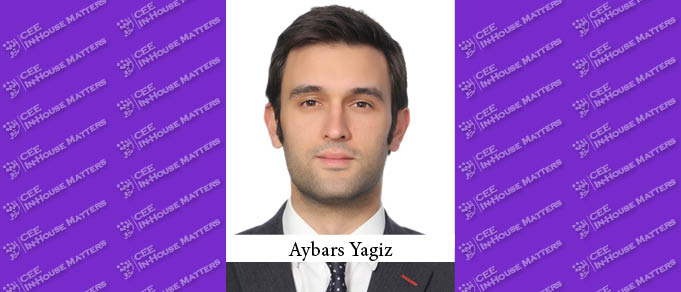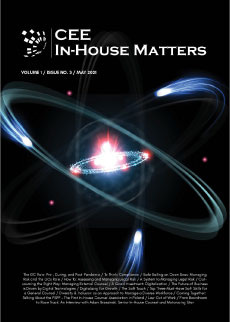Aybars Yagiz, Legal Counsel at GAMA Enerji, Turkey, and Board Member at the GAMA group of companies, shares his thoughts about the soft skills senior in-house legal counsel should possess.
CEEIHM: The last year or so has been very difficult for both companies and professionals around the world. How large is your team, and how did it adapt to the crisis?
Aybars: We have a rather small legal team. In addition, I also manage the contracts team, which includes valuable engineers and trade specialists. Our company operates in the energy sector, and we produce and sell electrical energy generated from different sources. At the beginning of the pandemic, there was a gap between the supply and demand of electricity. No one had the opportunity to prepare for such a big crisis, so our initial reaction was somewhat slow. However, energy isn’t a luxury but a necessity, so the market gradually went back to normal.
In order to adapt to the crisis, we maintained fairly stable working hours. My management policy is not to push my team to work past 6 p.m. If and when there is anything urgent to do, I tell my team to adapt their schedule and, if I need them to stay after normal working hours, I tell them a few days in advance. My approach is that, if the task is not urgent, it’s better for an employee to do it when they feel more like it. So, if someone from the team hasn’t finished all the work by the end of the day, they can always continue tomorrow. Working in a more relaxed environment makes for a happy team.
CEEIHM: What skills should GCs possess in order to mitigate the negative effects of the crisis and keep their teams productive?
Aybars: Soft skills are very appealing to me. I recently completed the Executive MBA program at the Bilkent University in Ankara. We would talk at length with our professors about the importance of soft skills, and how to develop them.
I believe that there are four key soft skills any GC should possess.
The first one is self-assurance. This should not be confused with self-awareness, which only stands for being aware of your potential. Self-assurance, which builds on that awareness, means to be content with yourself and with what you can and cannot do. This skill is very important in overcoming the “legal ego,” which is a huge problem among some legal professionals. A GC is a very substantial element in any company, yet not the leading one, unless the main field of activity is law. Even acknowledging this fact helps to overcome the “legal ego.”
The second important soft skill is conflict management. A GC must be able to handle and solve the conflicts that arise between his or her company and a third party. However, a general counsel must also be able to solve internal conflicts between employees, or between employees and the company.
The third skill is communication. This is useful not only for conflict resolution but also for risk evaluation. The problem with many non-legal disciplines is that they evaluate risk only in financial parameters. Good communication is essential to providing multiple view-angles to the risk assessment and problem-solving processes. A general counsel should never put a full stop after his factual findings, but rather hear out and accept different opinions. In other words, the task is to build a bridge between the wishes of the company and reality. The wishes are never-ending but need to be adapted to reality. Of course, communication within the legal team is very important as well, as it is the legal department that sets the tone of the company.
Finally, coaching is very important. At our company, we divide coaching into role-play and self-evaluation. During the role-play, I delegate the leading role on a project to one of my colleagues. That person is put in charge of the team and decides, with my supervision, what our strategy should be, assigns tasks to the team members, and so on. This approach not only gives my team a better overview of the legal work we do but also puts me in their shoes and helps me better understand how they feel and work. We also organize regular self-evaluation sessions where all the team members express constructive criticism of their own work. I believe that these activities help build integrity and closer relations within a team – and it definitely has in our team, thanks to my colleagues, Yuksel and Mina.
CEEIHM: What is your advice to other GCs on how to develop and improve those skills, not only in themselves, but within their team as well?
Aybars: It depends on the size of the team. If you have a manageable number of people, the right way is to spend time with your team outside work. It is difficult to empathize with someone you barely know, which makes it difficult to understand and help them handle their problems. If your team members feel that they are cared for, they will feel much better, be more productive, and that will also help resolve most of the issues that arise. Strictly speaking, you are recruiting a lawyer, not a friend. But being able to have good relations with your team members is crucial. Otherwise, without good communication and a friendly relationship, you won’t benefit from that person’s knowledge and expertise as much as you could.
As for self-assurance, the most important tool for calming the legal ego is to learn to say “I don’t know.” Of course, if that answer becomes too frequent, perhaps that person is lacking technical knowledge. That’s why a proper follow-up would be “but I will get back to you.”
CEEIHM: Finally, how long into the future do you expect this crisis to persist, and what challenges lie ahead?
Aybars: The government is taking proactive measures to end the pandemic. However, it is most likely that these conditions will stay for a little while longer. One of the government’s measures was to pass regulations on remote working. Under the new regulations, companies can have their teams work from home, or split the work week between home and the office. I believe that this work model will become permanent. We are also discussing whether to hire people from other parts of the country or even from abroad. Communication, coaching, and team management, in general, would become a bit more challenging in any of these scenarios. I count on new technologies to help us solve these problems. ||
By Djordje Vesic
This article was published in issue 1.3 of CEE In-House Matters. The full edition is available here in pdf format, here in e-reader format, and here in electronic format.


